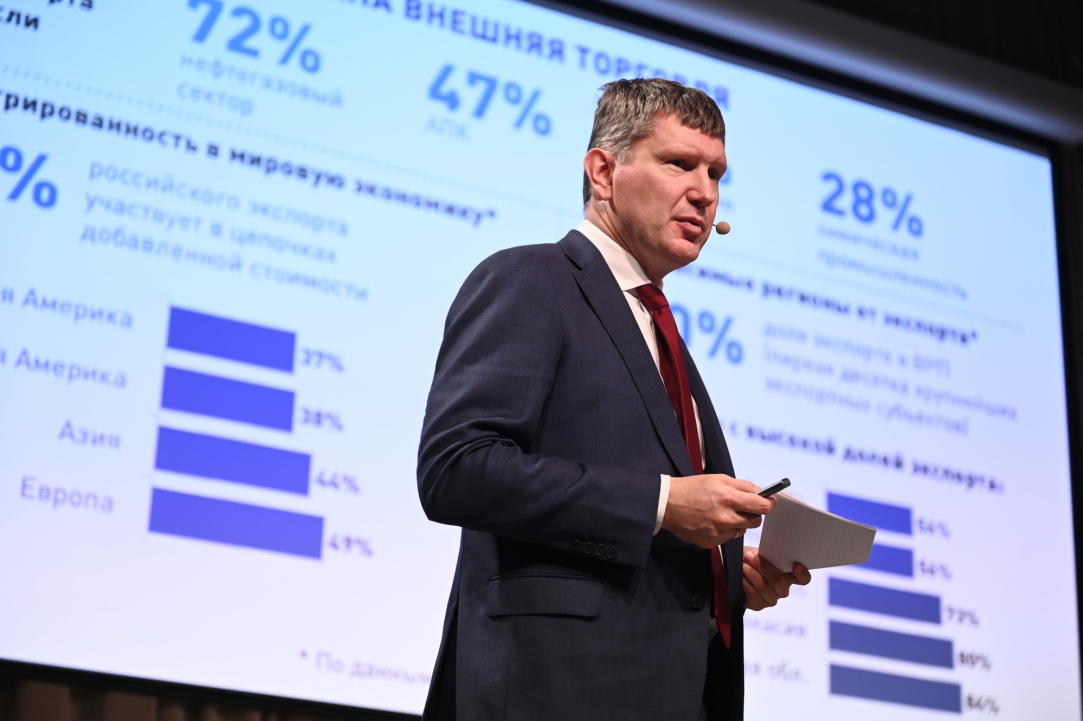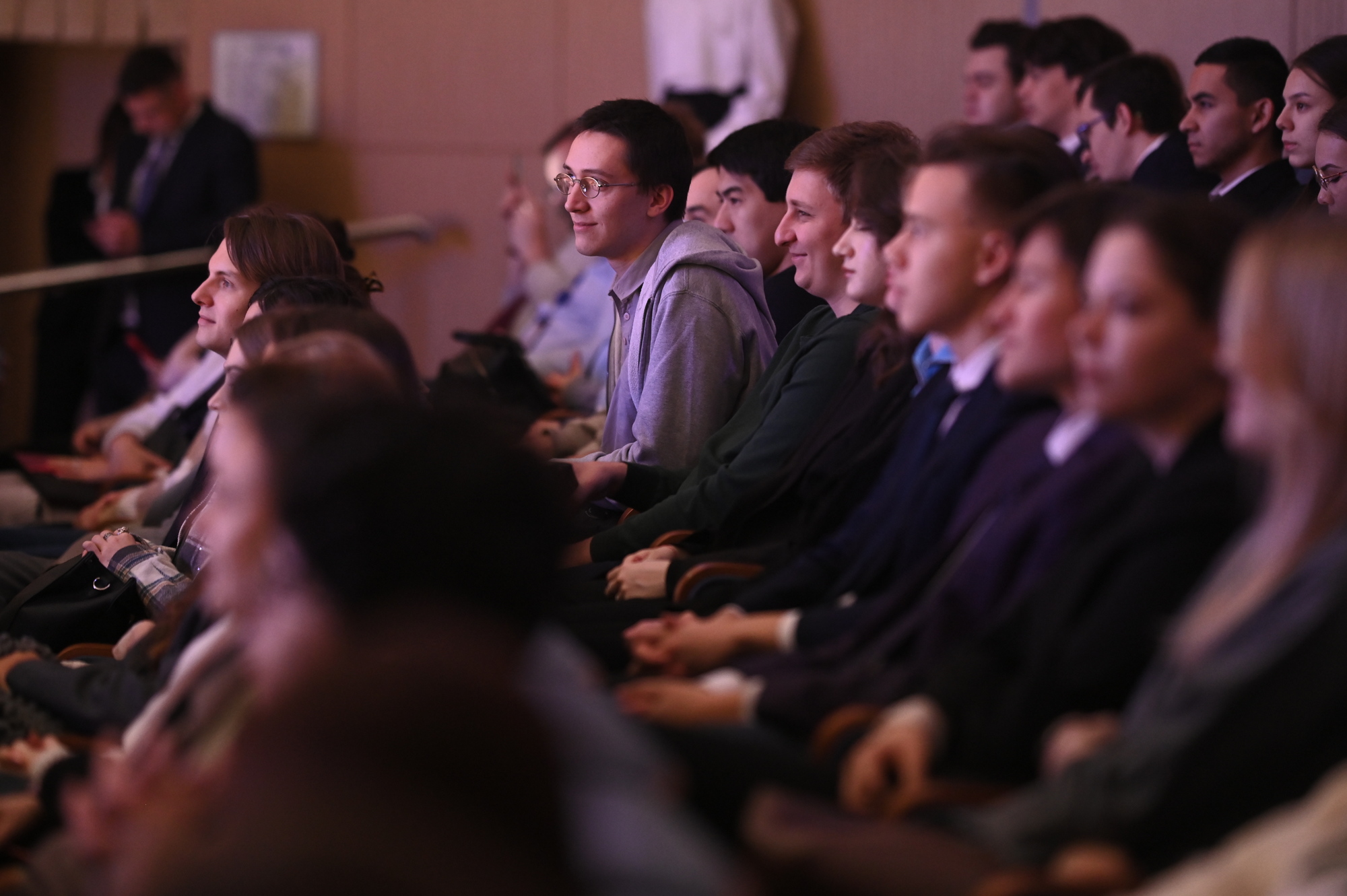Maxim Reshetnikov: ‘An Effective Open Market Economy Has Been Built in Russia’

On November 11, 2024, during Economist Day in Russia, Maxim Reshetnikov, Russian Minister of Economic Development, spoke to students of the HSE Faculty of World Economy and International Affairs about Russia’s foreign economic activities, how the country managed to withstand unprecedented sanctions pressure, and the current state of its development.
The meeting was opened by HSE University Rector Nikita Anisimov. He congratulated everyone on their professional holiday, Economist Day, and emphasised that the event would not be a lecture, but rather a strategic vision of how the country is evolving. According to him, the primary focus of the government and HSE, as a governmental university, is human-centric development aimed at enhancing the well-being of every individual.
Maxim Reshetnikov thanked the Rector for his warm introduction and extended his best wishes on the holiday: ‘I have been involved in economics for many years and I have never been disappointed. For me, economics is the search for a complex balance where resources are limited and needs are unlimited.’ Addressing the students, he also pointed out that the gap between listening to someone in an auditorium and speaking in front of one, being responsible for a complex area of work, is often bridged quickly in life.
Russia is the fourth largest economy among the world's top ten economies, noted the minister at the beginning of his speech. The national economy is integrated with the global market and part of global value chains, with many sectors export-oriented: the oil and gas industry, agriculture, fertiliser production, metallurgy, and the chemical sector. Russia plays a significant role in the global economy, leading in the supply of several goods and acting as a key trading partner for many countries. The structure of exports is changing, with an increase in the production of high-value-added goods. ‘Last year, for example, Russian companies delivered high-tech products to 154 countries. We are diversifying our exports, and many small enterprises have entered the export market,’ Maxim Reshetnikov emphasised. In the early 2000s, Russia was ranked 17th in the world by export volume; now, it is 13th, with its contribution to global GDP rising from 2.9% to 3.5%.
Maxim Reshetnikov highlighted that despite the number of sanctions imposed on Russia being several times greater than those on Iran, the situation remains stable. Russia is experiencing significant economic growth and exceeding global averages. According to the Russian Ministry of Economic Development's forecasts, GDP will grow by 3.9% by the end of 2024.
This has been achieved thanks to the fact that over the past 25 years, an effective, open, and competitive market economy has developed in Russia. ‘Such statements are rarely made, as we are always focused on challenges. But looking back, we have come a long way. Our entrepreneurs have created highly effective companies that compete successfully in the global market,’ Maxim Reshetnikov stated confidently.

Russian businesses managed to quickly restructure logistics, trade, production, and technological chains. ‘We were heavily reliant on the West technologically. But having strong engineering services that understood all processes allowed us to adapt quickly,’ said the minister. ‘Without effective management and entrepreneurship, this would not have been possible. They are the ones who made it happen,’ he stressed. It is necessary to respond to external pressures by expanding internal entrepreneurial freedom.
Today, as a result of the restructuring and reorientation of foreign economic activities, 85% of exports go to friendly countries, and most transactions are conducted in roubles and national currencies, while the share of the dollar and euro has decreased several times. The current goal is to build a network of partnerships with friendly countries, including creating an investment-settlement platform within BRICS, as recently discussed by President Vladimir Putin. One of the priority regions for developing foreign economic activities, according to the Minister, is Africa, which holds significant opportunities for exporting educational services and products.
After the lecture, Maxim Reshetnikov answered students' questions. They asked him about global economic development scenarios, cooperation within the Eurasian Economic Union, the opportunities and risks of the economic situation in their country, prospects for entrepreneurship, sustainable development, WTO cooperation, issues related to single-industry towns, and other topics.
See also:
‘Teaching Is a Learning Experience for Me—Every Question Is an Opportunity to Update My Lecture Material’
Kemal Kivanc Akoz is an Assistant Professor of the Department of Theoretical Economics at the Faculty of Economic Sciences. He has been at HSE University for six years and his current activities include research into marriage market dynamics and information agreements among groups of agents. In this interview with the HSE News Service, Kemal talks about the subjects of his research, the teaching approach that led to him being named one of the university’s Best Teachers, his favourite places to get a coffee in Moscow, and more.
‘I Hope You Have Entered the Economic Profession Consciously’
On November 11, 2024, the HSE Faculty of Economic Sciences hosted a celebration for Economist Day. Many of the university's partners came to congratulate HSE on the occasion. The atrium on Pokrovsky Bulvar hosted booths from VkusVill, Ozon, HeadHunter, Wildberries, and other leading companies. Students and professors participated in quizzes, spun the wheel of fortune, painted, and crafted.
FES Announces the Winner of the Nobel Prize in Economics 2024 Prediction Contest
The HSE Faculty of Economic Sciences summarised the results of its traditional prediction contest. FES holds this contest annually on the eve of Nobel Week. This year, the contest once again attracted participants from different regions of Russia and countries around the world. Remarkably, one participant managed to predict all three laureates of the 2024 Economics Prize.
Try Your Hand at Predicting the 2024 Nobel Prize Winner in Economics
The Faculty of Economic Sciences is launching its annual prediction contest. On October 14, the Nobel Committee will announce the winners of the Sveriges Riksbank Alfred Nobel Prize in Economic Sciences live on air. You have time to prepare and explore the landscape of contemporary economic thought. What topics and areas are considered particularly important and promising at the moment? Anyone can win.
Choosing the Right Server Results in Better Outcomes in Doubles Tennis
The Roland Garros tennis tournament, one of the most prestigious in the world, began on May 26. The prize money for this year's French Open totals nearly 54 million euros, with athletes competing in both singles and doubles events. In doubles tennis, choosing the right strategy for a match is crucial. Athletes' ability to adapt to the dynamics of the match and strategically choose the server can earn the pair up to 5% more points, according to Nikolai Avkhimovich, doctoral student and research fellow at the Laboratory of Sports Studies of the HSE Faculty of Economic Sciences. A paper with the study findings has been published in Applied Economics.
Consumer Prices Decrease in Densely Populated Areas
HSE University economists have proposed a novel approach to modelling monopolistic competition with heterogeneous firms and consumers. The results of collaborative research carried out by Alexander Tarasov from Moscow, his co-authors from HSE University–St Petersburg, together with the Norwegian School of Economics, the University of Pennsylvania, and the Free University of Brussels, have been published in American Economic Journal: Microeconomics.
Football Players Cover Greater Distances During Critical Derby Matches at Home Arena
Researchers at the HSE Faculty of Economic Sciences examined the level of effort that professional football players are willing to exert during a match in absence of financial incentives. It appears that the primary factors driving players to strive harder for victory are the strength of the opponent and the significance of the match for the club. This is particularly noticeable in derby matches between teams from the same city, such as the Moscow derby between CSKA and Spartak on April 25, 2024. The study has been published in the Journal of the New Economic Association.
Participation in Crowdfunding Can Generate up to 73% in Returns Annually
Backers of projects on crowdfunding platforms can expect rewards from their pledges. For example, funding someone's idea on Kickstarter can result in an average annual return of 11.5%, with design projects known to deliver returns as high as 70%. However, it is important to note that these returns do not come in the form of direct cash payments but rather as savings on the purchase of the product once it hits the market. This has been demonstrated in a study by researchers at the HSE Faculty of Economics published in Economic Analysis Letters.
Economists Suggest Using Media's Attention to Bitcoin to Predict its Returns
Researchers at the HSE Faculty of Economic Sciences have studied the relationship between the changes in the bitcoin prices and the media attention to this cryptocurrency. The researchers examined the mentions of bitcoin in the media between 2017 and 2021 and built a mathematical model that revealed the strong relationship between media attention and bitcoin prices. The study was published in the Applied Stochastic Models in Business and Industry journal.
HSE Economists Develop a Model for Sustainable Solar Geoengineering Agreements
Researchers at HSE University and George Mason University have investigated the sustainability of prospective international agreements on solar geoengineering. The authors have proposed a scheme in which payments flow from affluent nations to less wealthy ones; an arrangement which sets their proposal apart from traditional systems. The proposed model aims to dissuade more vulnerable countries from excessive use of the prevalent geoengineering method by providing compensation for the potential damage they may incur and supporting their adaptation to climate change. The paper has been published in Environmental and Resource Economics.


